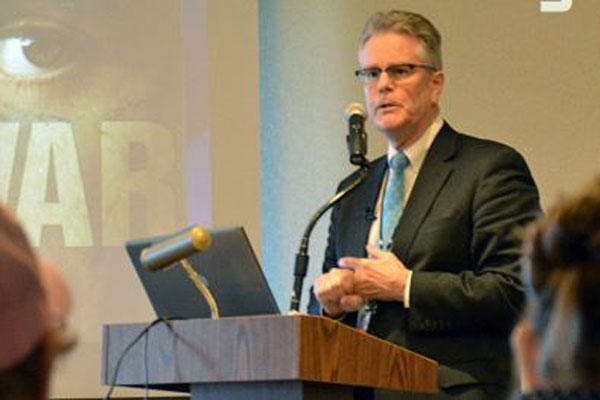Doctors learned a great deal about post-traumatic stress disorder in the years following the Vietnam War.
Terence M. Keane, Ph.D., director of the Behavioral Science Division of the Veterans Affairs Department's National Center for PTSD in Boston, last week called the decades-long advances in diagnosis and treatment "stunning."
But Keane believes it was the 9/11 attacks -- which shook America far beyond the attack locations in New York; Washington, D.C., and Pennsylvania -- that brought PTSD home to the country as a whole.
"Now everyone understood the issues of trauma, issues of war -- there was no question," Keane told Military.com. "And people knew more about PTSD after 9/11 within a week. That was a major change in this country."
"I think it contributed to the recognition on part of our population that if we send people to fight, we give them whatever support they need" when they come home, he said.
Keane, in addition to his work at the VA Medical Center in Boston's Jamaica Plain neighborhood, is a professor of psychiatry and assistant dean for research at Boston University School of Medicine.
On Friday, VA Secretary Bob McDonald presented Keane with the VA's John Blair Barnwell Award, recognizing him as a world leader in the field of traumatic stress. The award is named for educator and physician-scientist Dr. John Blair Barnwell, who was director of research and education at the VA in the 1940s.
McDonald, who also used his Boston visit to pitch the VA as a career choice to more than 200 healthcare workers now training at the Boston facility, noted Keane's research as an example of the kind of trailblazing work that the VA does.
"This excellence [in research] that we had in the past is continuing today" with the VA's work in PTSD and other injuries, McDonald said.
Keane, in remarks after receiving the award, said the importance of the work the VA does and the patients it serves make it the most rewarding place to treat patients and conduct research.
"Not only is our mission to care for combat veterans supremely important to this nation, our patients readily serve as active participants in our research studies in remarkably altruistic ways." Keane said, adding that the typical response of veterans asked to take part in a study is: "'If you think it will help other folks, doc, I'll be happy to participate.'"
PTSD Pioneer
Keane has been studying PTSD for decades. He is one of the VA's pioneers in the illness. He was studying it, he said, "before it was [called] PTSD."
Even before much of the country, including the government, recognized it as something real, he said, recalling a time when many denied that combat trauma played a role in service members' and veterans' mental health problems.
In some places, veterans groups such as the Veterans of Foreign Wars -- still largely made up of World War II vets -- refused entry to Vietnam veterans. And even among some Vietnam vets, there could be dismissal of trauma-induced mental health issues.
"The atmosphere was 'these are all a bunch of crybabies,' " Keane said. "I had a cousin who was a Vietnam veteran, and he said, 'Terry, aren't these all guys who were the ones in trouble before they got sent [to Vietnam]?' "
Keane said that as he became interested in mental health problems of Vietnam veterans and the schism that developed within the U.S. over the war, he researched and found there also were conflicting views of whether Americans should have been fighting in Europe during World War II.
"That the country was attacked by Japan is one [thing], but there was a lot of discussion in the country about what we should do there" in Europe. "There was isolationism, which was historic in our country," he said.
But World War II ended within five years. It also ended in total victory for the U.S.
Lesson from a quagmire
"Vietnam was the quagmire we're trying to avoid in Iraq and Afghanistan," Keane said. And even though those conflicts have gone on longer than even Vietnam, and though many may have opposed them from the start, the country has shown itself able to separate the service members and veterans from the wars.
Separating a conflict from those sent to fight it "was a lesson that was very hard fought."
"It is something that was learned, and I think it was to the leaders' credit -- the leaders in Persian Gulf War I and then even in the early parts of Gulf War II [Iraq and Afghanistan] actually served in Vietnam. And so they knew the price of making that mistake. They took it very seriously to ensure that didn't happen again."
-- Bryant Jordan can be reached at bryant.jordan@military.com. Follow him on Twitter at @bryantjordan.




























